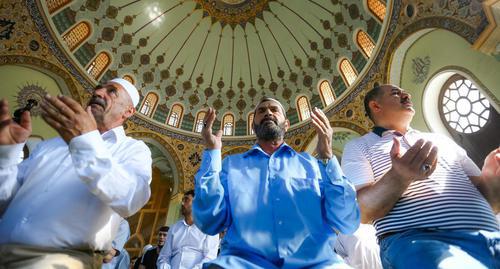
21 May 2018, 09:19
Week in the Caucasus: review of main events of May 14-20, 2018
Start of Ramadan fasting by Caucasian Muslims; militants' attack on Orthodox church in Grozny; opening of the Crimean Bridge, – see the review of these and other events that occurred in the Caucasus on May 14-20, 2018, prepared by the "Caucasian Knot".
Muslims of the Caucasus start their Ramadan fasting
On the decision of the Russia's Council of Muftis, in most Russian regions, the holy month of Ramadan began on May 16. The Muftiates of Chechnya and Dagestan appointed the first day of fasting in honour of Ramadan for May 17. The Spiritual Administration of Muslims (SAM) of Chechnya explained this by the fact that on May 15, the young moon failed to appear in the sky, which is considered a prerequisite for the completion of the Shaaban Month, which precedes the Ramadan in the Muslim calendar. In Southern of Russia, Ramadan began on May 16 in Adygea, Krasnodar and Stavropol Territories, Volgograd and Rostov Regions and Kabardino-Balkaria, while on May 17 – in Ingushetia and North Ossetia. The Islam scientists believe that the discrepancy in the starting day of Ramadan among Muslims of Southern Russia has no political meaning, but indicated the absence of a single authoritative Muslim centre. The Russia's Council of Muftis sees no problem in using different methods for defining the start of Ramadan.
In Moscow, at the Memorial Mosque, the so-called "Ramadan Tent" was set up for the 13th year in a row to host various charitable and educational events. In the evening on May 19, the party was dedicated to Ingushetia. During the month of fasting, Muslim believers are instructed to abstain from eating and drinking during the daytime, to do as many good things as possible, give alms and help those in need. Ramadan will end with the Uraza-Bayram holiday.
Militants attack Orthodox Church in Grozny
On May 19, the Archangel Michael Church, located in central Grozny, the capital of Chechnya, was attacked. According to investigators, seven people were killed in the course of the attack: two policemen, four militants and one believer; two more policemen and a believer were wounded. According to a source from security bodies, the attackers were three residents of Chechnya and one resident of Ingushetia. The responsibility for the attack was claimed by the Caucasian branch of the "Islamic State" (IS), a terrorist organization, banned in Russia by the court.
According to the calculations, run by the "Caucasian Knot", the attack on the church in Grozny was the third attack undertaken on religious sites in Northern Caucasus in 2018. The responsibility for the two previous attacks was also claimed by the IS. The attack on the church in Grozny was the second one from the start of the year, committed against North-Caucasian Orthodox believers. The first one was in February in Kizlyar, where five people perished.
Crimean Bridge opened by 2018 summer tourist season
The Crimean Bridge connecting Kuban (the Krasnodar Territory) with the Crimea was opened on May 15. On May 16, the "Crimean Bridge" Information Centre reported that within 12 hours after the opening, the bridge broke the daily record of the Kerch ferry crossing – about 14,000 vehicles passed over the bridge.
The authorities of the Krasnodar Territory associated with the bridge opening their hopes for an increase in the tourist flow; while residents of the Crimea – for the reduction of cost of foodstuffs and other goods. However, residents of Kuban report problems with medical care in Taman, which tourists may face. Hotels owners fear that an easy way to Crimean resorts will destroy their business. Let us note here that after the Crimea's incorporation into Russia, Ukrainian politicians demanded to stop building the bridge across the Kerch Strait.
Officials in charge of NCFD and former Kuban Governor are outside new Russian Govt
On May 18, Russian President upheld the Premier's proposal to appoint Sergey Chebotaryov as Minister for North-Caucasian Matters. Lev Kuznetsov, who occupied this post earlier, was not included into the new Russia's Cabinet of Ministers (Government). Also, Alexander Khloponin, a Deputy Prime Minister, and Alexander Tkachov, the Minister of Agriculture and the former Kuban Governor, also lost their posts. Let us note here that in 2010-2014, Mr Khloponin was the president's plenipotentiary envoy in the North-Caucasian Federal District (NCFD). With his participation, the State Programme for the Development of the NCFD until 2025 was approved, and the "North-Caucasian Development Corporation" and the "Resorts of Northern Caucasus" were created.
Drivers of fixed-route minivans in Makhachkala go on hunger strike
On May 14, in Makhachkala, 16 drivers of route No. 61A, dissatisfied with the working conditions in their company, started a hunger strike. They refuse to change their vans and pay for it, saying that they will be ruined. In total, since April 27, 73 out of 100 drivers of the route are on the strike. On May 17, the city's leadership met the striking drivers. Abusupyan Gasanov, the acting head of Makhachkala, urged them to stop their protest; however, the strikers found the meeting with bureaucrats fruitless. On May 15-18, three hunger-strikers were hospitalized. Residents of the Makhachkala settlement of Semender are experiencing difficulties with their travels due to lack of transport and are late for work and study because of the strike.
Court starts considering torture case in Ingush "E" Centre
On May 18, the Garrison Military Court of Nalchik held the first session on the case of Ingush law enforcers accused of using torture. The session was attended by relatives of the suffered defendants. Seven employees of the Centre for Combating Extremism ("E" Centre) of the Ministry of Internal Affairs (MIA) of Ingushetia, accused of murders, robbery, extortion, abuse of powers with the use violence against detainees, and of other crimes, refused to admit their guilt. The victims hope for a fair trial. The court sessions will be held four times a week.




